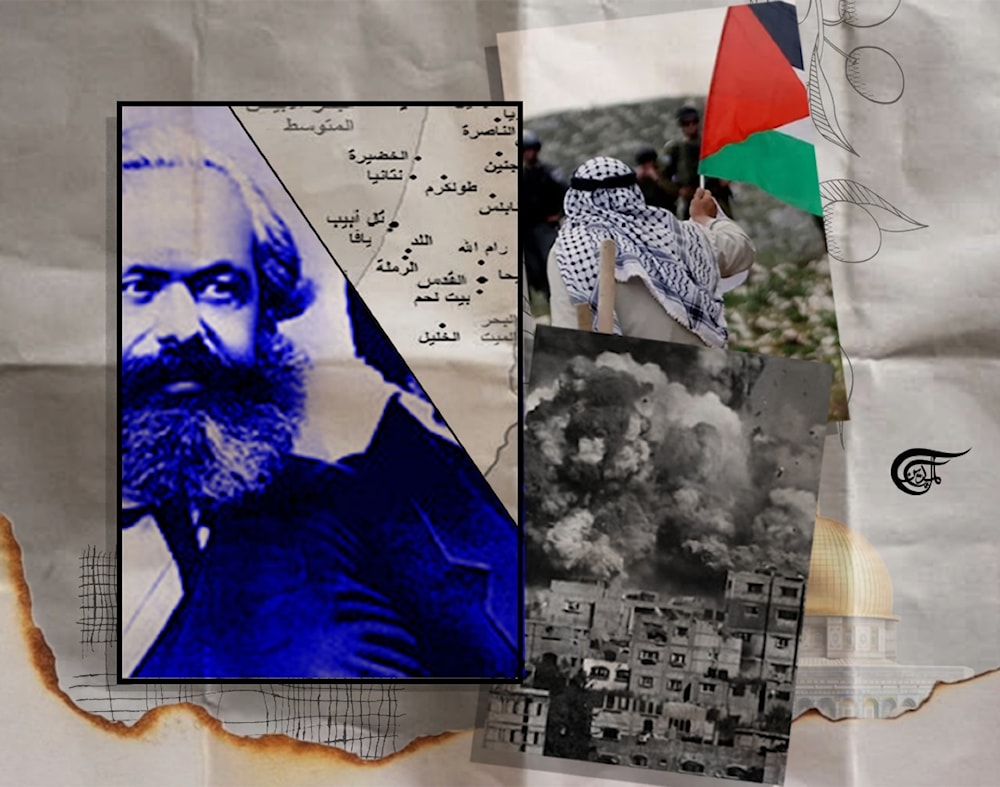Palestine and the Problem of Land
Peter Linebaugh's article makes no mention of Operation Al-Aqsa Flood, the Axis of Resistance, or Iran, which form constituent elements of the ‘real movement’ in West Asia away from the dominance of imperialist power centers.
-

Palestine and the Problem of Land (Illustrated by Batoul Chamas; Al Mayadeen English)
The principal contradiction of our world system today remains the antagonism between the collective imperialism of the triad (US, EU, Japan) and the working peoples of the Third World. Palestine, through Operation Al-Aqsa Flood has gestured toward a resolution of this contradiction regionally and globally. A great many articles have come out since October 7, some revolutionary and some missed the mark. Peter Linebaugh’s recent article in Counterpunch, Palestine and the Commons: or Marx and the Musha’a represents a certain Western phenomenon of attempting to place urgent political questions of the Third World within a framework of political theory developed in the West. The article presents a detailed view of the historical development of communal agricultural land in Palestine, namely the musha’a.
This communal land structure lasted for over 400 years during Ottoman rule and was a site of resistance to Anglo-Zionist colonialism. Linebaugh details the British colonial practice of enclosure of the commons and posits that there is a straight line connecting the enclosure of the commons in England and Ireland, the genocide of indigenous peoples in the Americas, and the ongoing genocide and colonial land theft in Palestine. This aspect of the article is handled deftly and shows that although colonial practices evolve and differ from place to place, the primitive accumulation of land and the means of production remains the key to reproducing capitalism and colonialism. Linebaugh describes the musha’a as follows:
…the musha’a as a village-based agriculture was another version of commons in land, and was collectively owned by the village, whose individual members owned shares (ahsahm) in its use rights…The threshing barn, like the land, was held in common… the musha’a allowed the redistribution and equalization of ahsahm to different family groups… These rights were heritable and were determined by the wants and needs of the cultivator.
As stated above, the problems with the article do not lie in Linebaugh’s description of the historical practices of the Palestinian people nor in his diagnosis of the connection between colonialism and the acquisition of land. Where Linebaugh falters is twofold: he places Palestine and Palestinian liberation within Western theoretical frameworks and he romanticizes historical practices, which themselves are not the question of the day in Palestinian society. In this article, these two deficiencies will be examined in order to put forward a view of Palestine that does not conform to the contours of Western historical surplus value. Historical surplus value is described by Anouar Abdel-Malek as “a process which ends by concentrating the elaboration of social theory and of schools of thought in general in the Western hegemonic centres."
On the question of romanticizing historical practices such as the musha’a, Linebaugh spends a good chunk at the end of the article detailing the letters written between Karl Marx and Vera Zasulich regarding the obshchina (mir), which was a communal agricultural form in imperial Russia. Linebaugh–relating the obshchina and the musha’a as historical forms–is content to reproduce Marx’s response to Zasulich’s question: can the obshchina be a seed for socialist transition? Marx responds affirmatively, but a revolution would be required in the rest of Russia and thus the obshchina itself cannot be a revolutionary form in isolation. No mention is made of connecting a broader Palestinian revolution to any revival of the musha’a. What Linebaugh also fails to mention is how these agricultural communes themselves ended up being facilitators of Russian feudalism after the liberation of the serfs. Jose Carlos Mariategui details this process in his essay ‘The Problem of Land’:
Under the system of landlords, the Russian mir…was completely denaturalized. The area of land available for community families became more and more inadequate and its distribution increasingly faulty. The mir did not guarantee the peasant enough land to support himself; on the other hand, it guaranteed the landlord a labor supply for his latifundium.
Mariategui thus shows how the system of feudalism integrated the communal land of the peasantry into the fold of absolutist rule. Mariategui also seems to see a benefit in the Islamic view of land ownership, which states that land belongs to the one who makes it fertile. So while Linebaugh quotes Marx’s famous dictum that communism is “the real movement which abolishes the present state of things," Linebaugh ignores much of the real movement in Palestine and West Asia, which is working to abolish the colonial, Zionist state of affairs. By focusing so much on the historical form of the musha’a, Linebaugh ends up agreeing with the conclusions of Noura al-Khalili, who states that because Palestinians are building high-rise apartments on former musha’a to prevent the apartheid wall from passing through their land, Palestinians have somehow capitulated to a capitalist or individualist rationality.
Linebaugh ends the piece with Marx’s response to Zasulich, which reads: “It is a question no longer of a problem to be solved but simply of an enemy to be beaten." While this is undoubtedly true, the quote coupled with the refusal to observe the ‘real movements’ in Palestine, which seek to end the current status quo, Linebaugh ends up paternalistically placing Palestine within a context not its own. The most egregious example of this is when Linebaugh argues that “the struggle is for liberation not for a new state," which flies in the face of what Palestinians have been calling for since the Nakba; that is, a singular state with equal rights for all. It also places a dividing line between liberation and state power. This line of thought follows the hegemonic, European Christian morals that underlie much of the theoretical production of the American left. This theoretical production often equates heroism with evanescence or futility while taking state power is seen as evidence that revolutionary principles have been abandoned.
Expectedly then, the beginning of the article decries the “paralyzing misfires and legacies of modernist state socialisms” despite large-scale land reforms and land-to-the-tiller movements in socialist countries historically and in the present. There is also no mention of Operation Al-Aqsa Flood, the Axis of Resistance, or Iran, which form constituent elements of the ‘real movement’ in West Asia away from the dominance of imperialist power centers. Together with the ad hominem attacks on the bogeyman of ‘state socialism’, it is clear that Linebaugh misses the woods for the trees. While the whole article is about the reclamation of the ‘commons’ through a revolution, Linebaugh ignores Zimbabwe’s radical nationalist program, which has redistributed land to the peasantry, despite sanctions and other forms of attack from the West. Nor does he mention Yemen and their 2019 National Vision Document, which calls for “in situ transformation of national resources, self-subsistence, and ecological transitions in agriculture…” according to Max Ajl. So while Linebaugh’s article is filled with quotations from Karl Marx and Marx’s insistence that “every step of real movement is more important and a dozen programs," Linebaugh’s article calls for the programmatic reproduction of the musha’a system and thus places the cart before the horse. By failing to mention existing land-to-the-tiller movements, he imagines that no one has attempted this in the modern era, if they have it is under the auspices of a 'paralyzing state socialism’ unworthy of support.
The question of land is undoubtedly important, especially to the Palestinian people, yet as Fathi Al Shiqaqi posited decades ago: “The debate about what comes first: confronting dependency, Westernization, and fragmentation, or confronting the Zionist entity is a theoretical debate governed by calculations of immediate gains and loss." So, the question does in fact remain a question of an enemy to be beaten, rather than a question of a problem to be solved.
Unfortunately, Peter Linebaugh inverts this in his article on the musha’a and thus places Palestine outside of its own context, while romanticizing a communal system that is currently unable to be reproduced under conditions of occupation and depopulation.

 Hanna Eid
Hanna Eid
 8 Min Read
8 Min Read










